Eighteen life-size politicians have assembled in San Jose on the first day of the state’s Democratic Party convention, and they all look stupid. Their suits and skirts and pantsuits have been flattened and covered from neck to toe in corporate and union logos. One elected official stands not far off but apart from the group, and he looks genuinely mystified by the scene of cardboard cutouts.
Rich Gordon, an assemblyman representing Palo Alto, Mountain View and other parts of the peninsula, has stumbled upon a protest against the influence of money on state politics. Before he can shrug and make his way into the San Jose McEnery Convention Center, however, another man races toward him with a small group of photographers in tow.
John Cox, a 60-year-old Midwesterner who made his fortune in law and real estate, confronts Gordon with a cardboard version of the assemblyman in his hand. Cox moved to San Diego to play golf and upend the state’s political system, he says, and he wears black wingtips, dark jeans and a white dress shirt under a slate gray blazer. His hair is white, with a sweeping part that thins at the base, and his eyebrows and nose sprout dark and white whiskers that lock like fingers.
Cox wastes no time in educating Gordon about his ballot initiative, which would force all state legislators to wear patches of their top 10 donors any time they speak or take an official action on the Senate and Assembly floors. While holding Gordon’s grinning cardboard cutout in one hand—his donor patches include Chevron, Walgreens, Time Warner Cable (none of which actually top his list) and a collection of unions—Cox tells the assemblyman that he and his colleagues should be scared of the ballot measure he’s organizing. After a brief exchange, Cox shifts tone and boldly asks Gordon if he wants to team up.
“Would you be willing to introduce this to the Assembly?” he says.
“No,” Gordon says, turning to go inside the convention.
The brief confrontation leaves Cox a bit disappointed but undeterred. “I don’t even know who he is,” he says. “I feel sorry for him. I guess he was offended. But it’s not that he’s corrupt; it’s that he works in a corrupt system.”

John Cox, center, confronted Assemblyman Rich Gordon (D-Palo Alto) with his own cardboard cutout on Friday outside of the the Democratic Party convention in San Jose. (Photo by Greg Ramar)
Shame Game
No pretenses are being made that Cox’s potential ballot measure will actually improve the system. Disclosure of all campaign contributions after raising $2,000 is already required by law, and those interested in the way money moves in politics can find reports on the Secretary of State’s website. The title of Cox’s initiative, Name All Sponsors California Accountability Reform, was a clever goof to use the acronym NASCAR. Just like the stickered racecars that require funding to roar around in varying degrees of left turns, or the drivers whose flame-retardant suits double as fitted billboards, it’s a nod to the fact that politicians in near-constant election cycles also have their influencers.
But considering the recent wave of corruption scandals engulfing California’s capital, the timing for such an outlandish initiative could be politically ripe.
A little less than two years ago the state Senate voted 28-1 to suspend Leland Yee (D-San Francisco), Ronald Calderon (D-Montebello) and Roderick Wright (D-Inglewood). Wright resigned in September after being found guilty of felony perjury and voter fraud. Calderon, who termed out of the Senate after being indicted for allegedly accepting $88,000 in bribes, still awaits trial. Last week a federal judge sentenced Yee to five years in prison for racketeering and accepting bribes in exchange for political influence. A few days after the verdict, Cox ferried his collection of cardboard cutouts to San Francisco and San Jose to preach for political reform.
Slapping sponsors’ logos on an elected official’s suit won’t stop the money from coming in, or dissuade felonious legislators from attempting to personally benefit from their public offices, but it might make legislators feel a little more self-conscious as they sing for their supper on the Senate and Assembly floors. Logistics such as the size of patches or placement are of little concern to the organizer.
“You understand: I don’t care how it works,” Cox says. “It’s just to shame them.”
Perhaps. But it could also be a way of raising the profile of a serial candidate in pursuit of elected office.
In 2000 and 2002, while still living in Illinois, Cox twice ran for Congress and lost. He had a stint as chair of the Cook County Republican Party and made another unsuccessful run for county recorder in 2004. Four years later, Cox became the first Republican candidate to declare for the 2008 presidential nomination. He says he spoke to standing-ovation crowds in Iowa and South Carolina but called off his run because he couldn’t get traction compared to better-known candidates. He says he debated a young Barack Obama and marched in parades with currently incarcerated former Illinois governor Rod Blagojevich.
“I’m a Republican and he’s a Democrat, so we didn’t have that much contact,” Cox says. “I marched a couple parades with him and knew he was an empty suit.”
Cox’s political NASCAR push, which has reportedly collected more than 70,000 signatures out of the 365,000 required by April 26 to qualify for the November ballot, is part of his larger goal to overhaul the entire state Legislature. Cox wants to break the state’s districts—40 in the Senate, 80 in the Assembly—into thousands of smaller districts: 12,000 to be exact. Of these people, 120 members would then be appointed to “working committees” to make laws in Sacramento. To accomplish this, Cox has committed to spending a million dollars of his own money to support NASCAR and set the stage.
“[NASCAR] is not going to make a difference just by itself, but it will get the public agitated and interested in reform,” says Cox, who uses the word “crony” about as often as The Catcher in the Rye’s Holden Caulfield used the word “phony.”
“The reform we’re talking about is the Neighborhood Legislature,” he continues. “It’s not about expanding the legislature, it’s about shrinking the size of districts and getting money and influence out of the picture.”
Multiplying the number of state representatives, he argues, will remove the incentive for donors to throw around as much money. Votes would be diluted and influence would dissipate. It would also make Sacramento a joke and completely unmanageable, according to a few of the individuals who cast votes.
“We have campaign disclosure,” Assemblyman Gordon says, “so to have somebody wear a uniform is pretty ridiculous.”
Evan Low, a first-term assemblyman who represents Campbell, scoffed at the idea of thousands of individuals with competing agendas accomplishing much of anything. The 120 individuals who make up the Senate and Assembly are hard enough to corral, and using an initiative like NASCAR to get there, he adds, is misguided.
“I think it’s a silly idea, but I also recognize the intent of what he’s trying to accomplish,” Low says. “One thing I don’t really like about this is we are making a circus of our public servants and democracy and the electoral process. Just imagine, if implemented, what this would look like: you sort of parade people around uncomfortably in this attire.”
Say it like that and more disillusioned voters might be motivated by schadenfreude.
But the attention being paid to NASCAR could be a new starting point for Cox, who admitted he might have an interest in running for governor after his current initiative. And after shaking up the statehouse, of course.
“You ask me if I’m going to run for governor,” Cox says, his voice rising. “I’m going to change the legislature.”
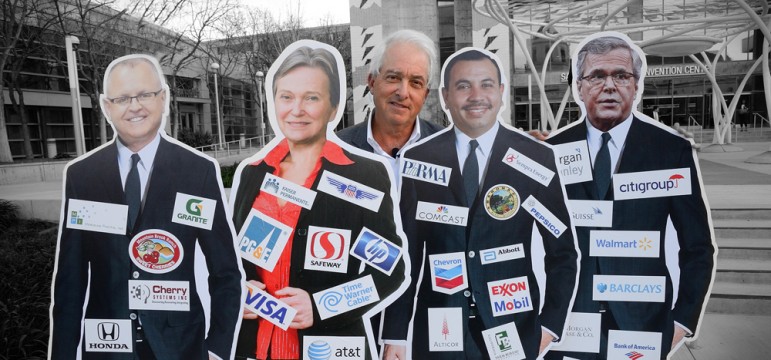
John Cox says he wants to reform the entire state legislature by massively expanding the number of seats, but he also could be eyeing a run for governor. (Photo by Greg Ramar)
‘Clean Suit’
The Voters Right to Know Act is a serious-sounding ballot initiative because it is. It intends to amend the state constitution by adding language about campaign finance disclosures. Crafted with the help of Bob Stern, the godfather of political reform in California, and Gary Winuk, the former chief enforcement officer for state political watchdog the Fair Political Practices Commission (FPPC), the measure offers substance over form.
It would prohibit lobbyists from handing out gifts to legislators, revise the rules on how big donors are disclosed in ads, double penalties for violations of the state’s Political Reform Act and update the state’s database to better track the way money flows between candidates and political action committees, or PACs.
Despite collecting more than 146,000 signatures—25 percent of its goal—as far back as Feb. 9, the biggest opponent to Voters Right to Know might not be special interests or shadow organizations affiliated with the Koch Brothers, but other government reform initiatives like NASCAR. Competing measures often make it more likely all proposals, even those with actual teeth, will fail.
Stern, who co-authored California’s Political Reform Act in 1974, called Voters Right to Know “the most significant” effort to police political contributions since the state’s landmark legislation more than 40 years ago.
Billionaire GOP activist Charles Munger Jr. is also pushing a constitutional amendment to make the system more transparent. Titled the California Legislature Transparency Act, the initiative would: require the language of all bills to be finalized 72 hours before a vote is taken, preventing any sneaky late additions; make all floor sessions and committee meetings available online within 24 hours; and allow anyone to video record these meetings, which is currently a misdemeanor.
“I would recommend this for all states,” Munger, a Stanford alumnus, told the school’s newspaper last month. “It’s time for all state legislatures to join the 21st century.”
Cox says he and Munger have met and discussed ideas to reform the state’s political system, but it doesn’t sound like the two saw quite eye to eye.
“I was president of the Cook County Republican Party,” Cox says. “I don’t take a backseat to any Republican.” In regards to Munger’s constitutional amendment, he adds: “It’s not going to move the needle.”
It’s that kind of talk that makes a Republican like Cox, who says he is anti-Trump and respectful of unions like the one that his schoolteacher mother was a part of, tough to pin down. He decries “cronies” and purchasers of political influence and then recommends a Washington Post op-ed—written by human succulent Charles Koch—that disingenuously laments a government designed to advance the interests of the nation’s wealthy elite.
The same cannot be said for NASCAR and its 121 cardboard cutouts—one for every state legislator and Gov. Jerry Brown, who is a third bigger than the rest. The ease with which Cox can explain the idea and the familiar acronym, make it a humorous proposal to pitch to journalists and voters on the street. There aren’t too many people who would pass up a chance to dress down a politician by making them dress up in donor logos.
“This is a means to an end,” Cox says, “and we’re doing this to ridicule the system. I hope what happens is everybody walks into the legislature with a clean suit.”
Or an ugly one.
John Cox’s proposed NASCAR initiative intends to shame state legislators by making them wear logos of their top 10 donors when speaking on the Assembly or Senate floors. Here’s a list of local legislators and their top contributors during the last election cycle, according to votesmart.org and the Secretary of State’s website.
This story has been updated.

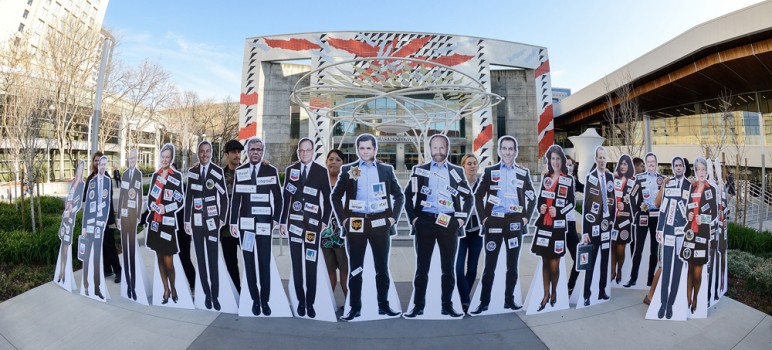
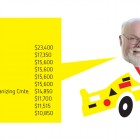
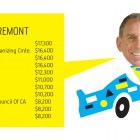

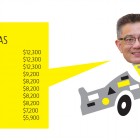
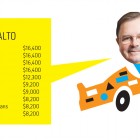
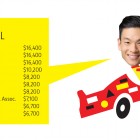
An interesting Idea, the problem is no one has the time to read about every politicians donor list.
We can’t even get people to look at what the top ten candidates running for president have done ‘ stand for,
or “ho-hum” taken money from.
As for shaming a politician, you would have better luck shaming a lion about what he had for dinner last night.
It’s the nature of the beast.
Oh yeah- look at how corrupt this guy Dan Bobay, member of the Milpitas school Board is. http://Www.milpitastrojannews.com
That’s my point Mr Arizona, I have no interest in small time politicians from some other area until they move into my space and start infecting the area with what ever crap they they have brought with them.
All politics is local. If you have a feral politician screwing up your district, inform your friends, neighbors, countryman, news paper, blog or TV station.
Rat him out!
The vacuum created by the absence of genuine integrity and selflessness in our elected bodies has risen to such intensity that no thinking person should be surprised by what it attracts. Just look at the abysmal quality of our legislators and other elected officials. Besides potted plants like the local Mr. Honda, we actually have in Congress a representative (Hank Johnson) who believes islands can tip over.
Donald Trump, a ridiculous choice for president by any traditional measure, is today a leading candidate because America’s worst generation, the know-it-all Boomers, have spent the last five decades battling against traditional measures. And they, along with their younger and equally clueless recruits, have won the war. In the last two decades they’ve elevated to the highest office Bill “Serial Scumbag” Clinton, G.W. “Tommy Boy” Bush, and Barrack “Sleeper Cell” Obama. Looking at these clowns you’d think America has no talent (and looking at Hillary you’d also think it has no taste). But it does — there are great leaders aplenty, it’s just that America has lost its measuring stick.
Because he had nothing to lose, Donald Trump could afford to do what no other presidential hopeful could risk doing, and that was to follow his nose. His sense that the people were ready for an unarmed revolt, coupled with his refreshing willingness to speak definitively, just might win him the White House (and if it does, he will be in debt to the destructive progressives). Today, Donald Trump represents only one line in the sand, and should I tomorrow encounter a petitioner for Mr. Cox’s over-the-top line in the sand, sign it I will. I’d rather be ridiculous than overrun.
And yet Republicans are the most fervent opponents of taking corporate money out of the political process. Pot meet Kettle.
CORONAFL,
That’s pretty ridiculous. Do you know the ratio of D’s vs R’s in this state? (and IANAR).
They all take the loot. Cox is right, the system is corrupt. An honest guy is at a big disadvantage.
Anyway, I’ll sign it. Like the author says, for schadenfreud. It’s about all the little guys have.
How much will this initiative cost the taxpayers?
It sounds like sour grapes from a wannabe politician.
This is one of the stupidest ballot initiatives ever. Most candidates have far more than 10 donors that max out at $4,200, so the questions is which 10 would they wear?
And besides the big $$$$ is driven through state and county political party and their committees, which as far as i know…(most of them) have no logos.
Ross,
How about the top ten? That would be fine with me. And yes, the big ones all have logos. But if one doesn’t, the name would do fine.
Looks like big corporations aren’t very well represented around here…..
An amusing idea.
But this is a case where, because the ethoses of Democrats and Republicans are fundamentally different, logo labels will be perceived and processed differently by Dems and Repubs.
Democrats are fundamentally tribal. The ONLY logo that matters to them is the patch with the big “D” in the middle of their chest. My tribe “good”, other tribe “bad”. All the other logos and patches that politicians might wear would be meaningless. The big “D” patch might be invisible to normal people, but Democrats wear special goggles and can see it.
Republicans are fundamentally capitalists, and capitalists are inherently traders. Repubs would undoubtedly scrutinize every label on every politician and contemplate whether there is a common interest that might be the basis of a “deal”.
Republican politicians talk endlessly about their prowess in negotiating, “working across the aisle”, and making deals.
Bottom line: “sponsor labels” would be useless to Democrats, but a boon to Republicans.
We might really like a list of oversea donors to say their foundations and tax exempt funds!
Have those tattooed onto their foreheads.
> tattooed onto their foreheads.
Ha!
Not nearly enough space.
Maybe they could tattoo a URL link to the index to Volume I of their encyclopedia of foreign donors and foundations.
Hmmmm, Bar code , I like it !
No different than the political side of @SCVWD, GET TAXES RAISED, SECRET TALKS WITH WASHINGTON, ETC, BUT THEY CAN’T even keep their own house clean, RMC, this board room engineer and his company RGD bought and sold march 8th 6pm this company with no board room experience, will hood wink the taxpayer, and the managers that told them what to say . tax loss they say around a million, but watch it will go over 2 million just as the first board room cost the taxpayer over 3 million////// AS ITS CORPORATIONS SELLING THEM EQUIPMENT……..LUNCHES, PERKS…….
Mr. Cox is extremely naïve if he believes he can SHAME a politician into doing anything. They are all utterly shameless.